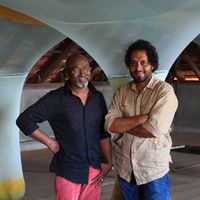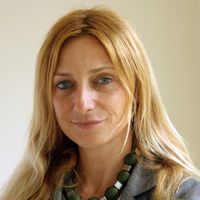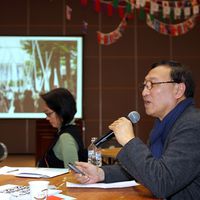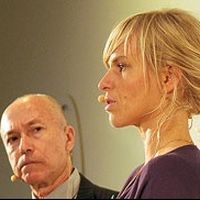India | Focus: Mumbai's first photography festival

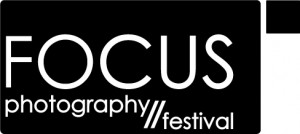
Veeranganakumari Solanki in conversation with the FOCUS co-founders Nicola Antaki, Elise Foster Vander Elst, and Matthieu Foss for culture360.org. Focus is the first photography festival in Mumbai and it took place between 13-27 March 2013.
Veeranganakumari Solanki: To begin, could you briefly outline the background and build-up towards the FOCUS festival. How was FOCUS conceived and why did you feel the need to initiate a photography festival in Mumbai?
FOCUS Team: FOCUS was born from a desire to bring art out into public spaces, and bring audiences into exhibition spaces. As a team we are very interested in encouraging people who are not necessarily “gallery goers” to engage with contemporary art and photography. That’s why you’ll find FOCUS exhibitions on view in a variety of diverse locations across the city.
[Elise] Nicola and I started discussing FOCUS in early 2012, and invited Matthieu Foss to join us on this exciting journey several months later. We then spent the next year building a wonderful team, and inviting the city’s most dynamic arts organisations, restaurants, boutiques and more to take part.
VS: All of you have spent a long time in India and been involved with various projects related to the arts. However, did you feel that not originating from India posed a challenge when you initiated this festival, and why did you choose Mumbai? Could you share your encounters with us?
FT: As you say we have all lived here for many years, so we all feel very much at home in Mumbai, and know how to initiate and execute cultural projects of this scale in the city. Over the years we have all worked with many of our FOCUS partners in different capacities, so we had their trust and support from the start. Without that Focus would not have been possible. There were of course challenges, like with any project, however they were more to do with the fact that this was a new concept, rather than to do with our nationalities.
VS: Is there a certain model or another festival structure, which you followed or studied while creating FOCUS?
FT: We looked at many different models when creating FOCUS, and were certainly inspired by festivals such as the Mois de la Photo in Paris (organised by the local government, the city invites spaces across the city to submit proposals for photography exhibitions), public art projects which exhibit works in outdoor spaces, and our friends who run the Delhi Photo Festival. Essentially, we had to create a new model that was appropriate for the cultural landscape, audience, and infrastructure of Mumbai. That was one of the challenges, which was also very interesting when conceptualising the project.
VS: There have been several events that you organised around the city, from exhibitions, portfolio reviews, talks, competitions and a treasure hunt. It has been a great way to involve “the city” (which was also your theme for FOCUS this year). Was this something that people and partnering spaces responded to with immediacy, or did it require a lot more effort? Could you talk about this with a few examples of individual experiences?
FT: Some elements of the programme happened very naturally and easily, others required a lot of research and persuasion! We were very grateful to our partners at Photo Corner and Pro Helvetia – Swiss Arts Council, who immediately offered to provide free books for the Open Library, which has been extremely successful. All the participating venues and international arts councils were also very excited about Focus, and were quick to agree and put together their own photography exhibitions. Since we planned the event a long time in advance, our partners all had the time to really think about what they wanted to show, and get involved in a meaningful way.
Some aspects were a little tricky, we spent a long time looking for the perfect Focus Hub, where we could centralise activities, host portfolio reviews and talks. We had a few false starts; however two months before the festival opened we learnt that a new restaurant, Cheval had opened just opposite two of our main exhibitions. They very kindly agreed to host us for the duration of the festival, and we found the perfect nucleus for Focus.
VS: In terms of funding; it is a huge effort to bring together something of this scale. All of you did invest your faith in the crowd-funding option, and also approached prospective sponsors alongside. Is this something you will continue doing for future editions too? Do you feel that this initiative made it a festival of the people?
FT: Crowd funding is a very new way to raise money for cultural projects - there is a certain beauty in exchanging gifts for donations, and building a project for the city, with the support from the city. We were humbled and overwhelmed by the generosity of individuals who believed in the project, whose contributions provided the seed funding which allowed us to get the festival started. However, to produce projects of this scale and to a high standard, serious investment is required, and this should not only come from individuals. Crowd funding and in-kind support is definitely valuable, but should not be a substitute for more formal philanthropic, corporate, or government support. We were extremely grateful to our primary sponsor, Bloomberg LP, and to Absolut who also supported the project. Thanks to them we were able to increase the festival’s scale, reach and scope on and offline. Both companies have had amazing faith in us, and understand why such a festival is important and necessary in our city.
VS: What were your expectations for FOCUS, and were they achieved? How and what would you change for future editions of FOCUS?
FT: As an organiser of an event, there is always this terrible fear that people won’t come. However, we needn’t have worried, attendance figures have been high, with all events packed to the brim, thousands of visitors enjoying the exhibitions, hundreds coming to the workshops and talks… More than the numbers, what has been incredible is the range of people who have been enjoying the activities. People from all ages, and all walks of life have been visiting the festival, and that has been amazing to see. It is fascinating to see that in its multiple facets, the photography community is constantly craving for opportunities to gather, exchange and endlessly debate and discuss. Focus has successfully provided that platform and opened it to a larger and diverse audience.
In terms of what we would change for future editions, it would be great to branch out even more into the streets and public areas of the city. We would love to see more exhibitions in the streets, parks and other outdoor spaces.
VS: Could you briefly talk about the overall response that FOCUS received, and how you envision the development, continuity, sustainability and future of the FOCUS photography festival?
FT: The response has been truly wonderful, the atmosphere has been amazing, so positive, with infectious enthusiasm from partners, visitors and contributors.
There is a real need for platforms of this type, not only to help young photographers, but also to celebrate photography, and the visual arts. Most of the galleries are open all year around, not just during Focus, and it’s important that people know that.
To develop the festival we will keep talking to photographers, cultural activists and partners, who can help us grow with their support and advice. We plan to host Focus every two years, to take it in turns, so to speak, with the Delhi Photo Festival which also happens every two years.
The future of Focus is very reliant on several factors: demand, the team, and funding. There is certainly demand for such an event, which is something that we knew already. The team have been amazing, offering their time, expertise and energy. It’s really thanks to them that we were able to produce an event of such a high standard. Finally, the elephant in the room, funding. We plan to continue to develop our network of partnerships and continue work with supporters such as Bloomberg and Absolut who have an admirable vision for the future of cultural partnerships in India.

